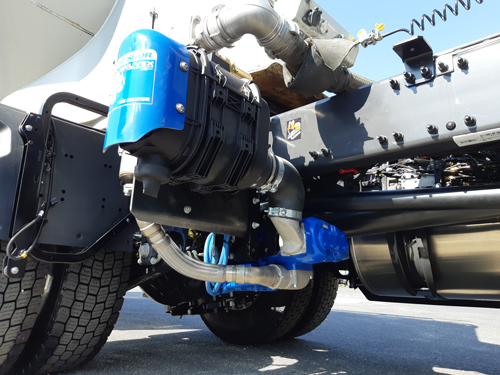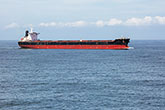The keys to optimising screw compressors in bulk transport
In the bulk transportation industry, trucks and their transport containers have become lighter. If a truck and container weigh less, they can improve their fuel efficiency and operational costs, while also slightly increasing their payload.

This change is not fuelled only by cost savings though. In the European market, recent regulations, such as Euro 6, have created stricter vehicle standards. These standards began in 1992 (Euro 1) and have evolved to their current iteration, established in 2015. The Euro 6 emissions standards are the strictest and address real-world NOx and PM emission from diesel trucks with changes to the heavy-duty vehicle test procedures, according to the International Council on Clean Transportation.
With the latest emissions standards and the trend to go lighter, screw compressors must also adapt to these requirements. This article provides the essential elements needed for screw compressors to become the preferred equipment choice in the bulk transport industry.
The lighter (and compact) side
Lighter screw compressors, especially for these applications, are possible. One example is the MX12 Screw Compressor from Mouvex®, Auxerre, France, a product brand of PSG. The MX12 compressor weights only 242 lb. (110 kg), which allows it to operate on the transport vehicle without impacting its efficiency.

Another important facet for transport vehicles, which put a heavy premium on space, is equipment footprint. Having equipment that takes up less space frees it up for additional product storage, which equates to a larger payload between transports. The MX12 also serves as an example of a compressor that has a small footprint. It measures between 21.3 – 22.4 in. (541 – 569 mm) long, 13.6 in. (346 mm) wide, and 17.76 in. (451 mm) tall.
Another valuable attribute is a design that allows it to fit in nearly any space without compromise. The most optimal design for a screw compressor in these applications is modular. With that kind of design, operators can install the screw compressor easily in a variety of locations. Additionally, a modular design makes it simple for operators to repair, modify, or upgrade the screw compressor as needed.
Consistent performance
Screw compressors in bulk transport applications need to provide consistent, reliable performance to help offload a variety of bulk products – such as cement, sand, gravel, plastic pellets, flour, calcium, and animal food.
Important performance attributes include a fast flow rate, robust pressure, and a low inlet speed. A screw compressor that can deliver flow rates up to 4975 gpm (1130 m3/hr) will substantially reduce the time it takes to offload a bulk product. For example, if a bulk load requires an hour to offload using a standard screw compressor, having equipment with a high flow rate can do the same job 10 – 30 minutes faster. Having a faster offload process allows operators to finish jobs faster and unload more bulk products every day.
A screw compressor also needs to reach and sustain enough air pressure to ensure the integrity of the bulk product delivery through the process. A screw compressor that can reach and maintain 29 psi (2 bar) of air pressure is capable of handling bulk loads of all sizes and consistencies – be it gravel or plastic pellets, or finer materials such as sand and flour.

One common problem for this equipment in these operations is overheating during operation. This problem will cause a screw compressor to stall, which will hamper the entire offloading procedure. To remedy this, screw compressors should incorporate an oil radiator into the apparatus. Doing so will regulate the screw compressor’s internal temperature so that it will not overheat and stall during operation.
Another consideration is selecting a screw compressor with an anti-vibration design. The problem with vibration is it causes stress to the compressor itself and can wear it down over time.
Finding a screw compressor with an anti-vibration design, especially in bulk transport applications, is ideal. Having a design to counter vibration will ensure the longevity and reliability of the screw compressor, leading to less downtime throughout its lifetime.
Conclusion
The demands for stricter emission requirements and lighter and more compact vehicles likely will not lose momentum in the near or distant future. Space on these vehicles is at a premium for a reason and essential equipment, such as screw compressors, should not be sacrificed for less effective technology. The Mouvex MX12 is an example of a screw compressor that provides the footprint and performance needed to help operators with their bulk transport needs without the need to compromise on efficiency or functionality.
Written by Christophe Jovani, Mouvex.
About the Author
Christophe Jovani is the EMEA – Marketing Communications Manager for Mouvex® and PSG®. He can be reached at Christophe.Jovani@psgdover.com. Mouvex was created in 1906 and is a leading brand of positive displacement pumps, screw compressors, and hydraulic coolers for use in the refined-fuels, oilfield, energy, food/sanitary, military, transport, and chemical-process industries. Mouvex is a brand of PSG®, a Dover company. Headquartered in Oakbrook Terrace, IL, USA, PSG is comprised of several major pump brands, including Abaque®, All-Flo™, Almatec®, Blackmer®, Ebsray®, em-tec®, Griswold®, Hydro™, Malema, Mouvex, Neptune®, Quantex™, Quattroflow®, RedScrew™, and Wilden®. For more information on Mouvex or PSG, please go to psgdover.com/mouvex or psgdover.com.
Read the article online at: https://www.drybulkmagazine.com/special-reports/24102022/the-keys-to-optimising-screw-compressors-in-bulk-transport/
You might also like
Bearing AI launches first AI-powered planning tool for shipping liners
Bearing AI has announced the launch of the first AI-powered planning tool for shipping liners to simulate the cost, emissions and performance impact of operational and commercial decisions.

